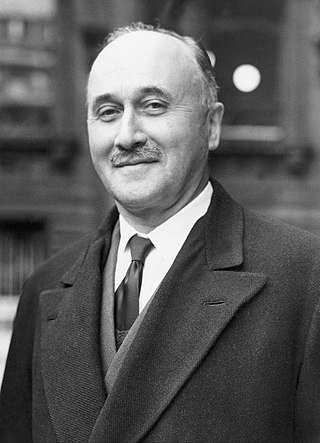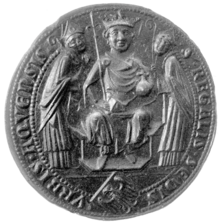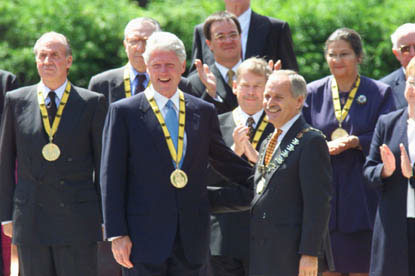
The Treaty of Rome, or EEC Treaty, brought about the creation of the European Economic Community (EEC), the best known of the European Communities (EC). The treaty was signed on 25 March 1957 by Belgium, France, Italy, Luxembourg, the Netherlands and West Germany, and it came into force on 1 January 1958. Originally the "Treaty establishing the European Economic Community", and now continuing under the name "Treaty on the Functioning of the European Union", it remains one of the two most important treaties in what is now the European Union (EU).

Paul-Henri Charles Spaak was an influential Belgian Socialist politician, diplomat and statesman. Along with Robert Schuman, Alcide De Gasperi and Konrad Adenauer he was a leader in the formation of the institutions that evolved into the European Union.
A number of symbols of Europe have emerged since antiquity, notably the mythological figure of Europa.

Jean Omer Marie Gabriel Monnet was a French civil servant, entrepreneur, diplomat, financier, administrator, and political visionary. An influential supporter of European unity, he is considered one of the founding fathers of the European Union.

Jean-Baptiste Nicolas Robert Schuman was a Luxembourg-born French statesman. Schuman was a Christian democratic political thinker and activist. Twice Prime Minister of France, a reformist Minister of Finance and a Foreign Minister, he was instrumental in building postwar European and trans-Atlantic institutions and was one of the founders of the European Communities, the Council of Europe and NATO. The 1964–1965 academic year at the College of Europe was named in his honour. In 2021, Schuman was declared venerable by Pope Francis in recognition of his acting on Christian principles.

Alcide Amedeo Francesco De Gasperi was an Italian politician who founded the Christian Democracy party and served as prime minister of Italy in eight successive coalition governments from 1945 to 1953.

The International Paneuropean Union, also referred to as the Pan-European Movement and the Pan-Europa Movement, is an international organisation and the oldest European unification movement. It began with the publishing of Richard von Coudenhove-Kalergi's manifesto Paneuropa (1923), which presented the idea of a unified European State. The Union's General Secretariat is located in Munich, but maintains branches across Europe.

The Coudenhove-Kalergi family is an Austro-Bohemian noble family of mixed Flemish and Cretan Greek descent, which was formed by the marriage of Count Franz Karl von Coudenhove (1825–1893) with Marie Kalergi (1840–1877) in 1857.

Pan-European identity is the sense of personal identification with Europe, in a cultural or political sense. The concept is discussed in the context of European integration, historically in connection with hypothetical proposals, but since the formation of the European Union (EU) in the 1990s increasingly with regard to the project of ever-increasing federalisation of the EU. The model of a "pan-European" union is the Carolingian Empire, which first defined "Europe" as a cultural entity as the areas ruled by the Roman Catholic Church, later known as "Medieval Western Christendom". The original proposal for a Paneuropean Union was made in 1922 by Count Richard von Coudenhove-Kalergi, who defined the term "pan-European" as referring to this historical sense of the western and central parts of continental Europe encompassing the cultures that evolved from medieval Western Christendom instead of the modern geographic definition of the continent of Europe. Coudenhove-Kalergi saw the pan-European state as a future "fifth great power", in explicit opposition to the Soviet Union, "Asia", Great Britain and the United States.
Academic years at the College of Europe are known as promotions. Each promotion is named after an outstanding European. A list of the promotions follows:

The year 1948 marked the beginning of the institutionalised modern European integration. With the start of the Cold War, the Treaty of Brussels was signed in 1948 establishing the Western Union (WU) as the first organisation. In the same year, the International Authority for the Ruhr and the Organization for European Economic Co-operation, the predecessor of the OECD, were also founded, followed in 1949 by the Council of Europe, and in 1951 by the European Coal and Steel Community, with the ensuing moves to create further communities leading to the Treaty of Rome (1957).

The founding fathers of the European Union are men who are considered to be major contributors to European unity and the development of what is now the European Union. The number and list of the founding fathers of the EU varies depending on the source. In a publication from 2013 the European Union listed 11 men. All but one were from the Inner Six of the European Union.
The European Parliamentary Union (EPU) was a private organization set up by Richard von Coudenhove-Kalergi, who was also its Secretary General. It held its preliminary conference on 4–5 July 1947 at Gstaad, Switzerland, and followed it with its first full conference from 8 to 12 September.

Jürgen Linden is a German politician and was Lord Mayor of Aachen from 1989 to 2009.

The Wilfried Martens Centre for European Studies, also known as the Martens Centre and previously as the Centre for European Studies, is a think tank and political foundation of the European People's Party (EPP). The Martens Centre links together a large network of political foundations across the European Union, which all hold centre-right positions and seek to advance those points of view in Europe and beyond. The president of the Martens Centre is former Slovak prime minister Mikuláš Dzurinda.
Polonicus is an award given to members of European Polish diaspora by Institut Polonicus, for building international dialogue, movements of unity and promoting Polish culture in Europe and the rest of the world.

Richard Nikolaus Eijiro, Count of Coudenhove-Kalergi, was a politician, philosopher, and count of Coudenhove-Kalergi. A pioneer of European integration, he served as the founding president of the Paneuropean Union for 49 years. His parents were Heinrich von Coudenhove-Kalergi, an Austro-Hungarian diplomat, and Mitsuko Aoyama, the daughter of an oil merchant, antiques-dealer and major landowner in Tokyo. His childhood name in Japan was Eijiro Aoyama. Being a native Austrian-Hungarian citizen, he became a Czechoslovak citizen in 1919 and then took French citizenship from 1939 until his death.
The European Charlemagne Youth Prize, sometimes shortened Charlemagne Youth Prize, is a prize that has been awarded annual since 2008 jointly by the European Parliament and the Foundation of the International Charlemagne Prize of Aachen. It is awarded to projects run by young people between the ages of 16 and 30 that support democracy in Europe and promote cooperation and understanding both in Europe and internationally. Like the Charlemagne Prize, which has existed since 1949, the Youth Prize is named after Charlemagne, ruler of the Frankish Empire and founder of what became the Holy Roman Empire, who is buried in Aachen, Germany.

The Jean Monnet House, sometimes referred to as Houjarray for the hamlet in which it is located, is a country farmhouse in Bazoches-sur-Guyonne, Yvelines, near Montfort-l'Amaury about 27 miles west of Paris. Jean Monnet purchased the house and surrounding land in 1945, upon his return to France after living abroad since June 1940. Monnet mostly lived there until his death in 1979, except in 1952-1955 when he headed the European Coal and Steel Community's High Authority in Luxembourg. Since 1982, the house has been owned and managed by the European Parliament.



![After awarding the Charlemagne Prize 2015 to Martin Schulz, the dignitaries met on stage at Aachen Katschhof [de]. From left to right can be seen: Bernd Buttgens (official spokesman of the city of Aachen), Armin Laschet (Parliamentary group leader of the CDU in North Rhine-Westphalia), Francois Hollande (President of France), Martin Schulz (President of the European Parliament), Joachim Gauck (President of Germany), Felipe VI (King of Spain), Petro Poroshenko (President of Ukraine), Sauli Niinisto (President of Finland), Simonetta Sommaruga (President of Switzerland), Hannelore Kraft (Minister-President of North Rhine-Westphalia), Jurgen Linden (Speaker of the board of directors of the Charlemagne Prize of the city of Aachen). KarlspreisKatschhof2015.jpg](http://upload.wikimedia.org/wikipedia/commons/thumb/f/f9/KarlspreisKatschhof2015.jpg/800px-KarlspreisKatschhof2015.jpg)















